Civil war
[5] Stathis Kalyvas defines civil war as "armed combat taking place within the boundaries of a recognized sovereign entity between parties that are subject to a common authority at the outset of the hostilities.[clarification needed][3] The Geneva Conventions do not specifically define the term "civil war"; nevertheless, they do outline the responsibilities of parties in "armed conflict not of an international character".[15] Higher male secondary school enrollment, per capita income and economic growth rate all had significant effects on reducing the chance of civil war.[15] Phrased another way: young males (who make up the vast majority of combatants in civil wars) are less likely to join a rebellion if they are getting an education or have a comfortable salary, and can reasonably assume that they will prosper in the future.[14] Most proxies for "grievance"—the theory that civil wars begin because of issues of identity, rather than economics—were statistically insignificant, including economic equality, political rights, ethnic polarization and religious fractionalization.He disagrees with the quantitative research methods of Collier and believes a stronger emphasis should be put on personal data and human perspective of the people in conflict.Beyond Keen, several other authors have introduced works that either disprove greed vs. grievance theory with empirical data, or dismiss its ultimate conclusion.[24] Some scholars, such as Lars-Erik Cederman of the Center for Security Studies (CSS) at the Swiss Federal Institute of Technology, have criticized the data used by Fearon and Laitin to determine ethnic and religious diversity.This suggests that ethnic, linguistic and religious cleavages can matter, depending on the extent to which the various groups have ability and influence to mobilize on either side of a forming conflict.[26] A third theme explored by Cederman is that ethnolinguistic fractionalization does not quantify the extent to which there is pre-existing economic inequality between ethnic groups within countries.[29] When considering a peace agreement, the involved parties are aware of the high incentives to withdraw once one of them has taken an action that weakens their military, political or economical power.Walter argues that when these issues are properly reversed, they act as political and legal restraints on executive power forcing the established government to better serve the people.Additionally, these political and legal restraints create a standardized avenue to influence government and increase the commitment credibility of established peace treaties.It is the strength of a nation's institutionalization and good governance—not the presence of democracy nor the poverty level—that is the number one indicator of the chance of a repeat civil war, according to Walter.[34] While there is a supposed negative correlation between absolute welfare levels and the probability of civil war outbreak, relative deprivation may actually be a more pertinent possible cause.[19] Evolutionary psychologist Satoshi Kanazawa has argued that an important cause of intergroup conflict may be the relative availability of women of reproductive age.Through her studies of the Salvadoran Civil War, Wood finds that traditional explanations of greed and grievance are not sufficient to explain the emergence of that insurgent movement.[38] Instead, she argues that "emotional engagements" and "moral commitments" are the main reasons why thousand of civilians, most of them from poor and rural backgrounds, joined or supported the Farabundo Martí National Liberation Front, despite individually facing both high risks and virtually no foreseeable gains.Wood also attributes participation in the civil war to the value that insurgents assigned to changing social relations in El Salvador, an experience she defines as the "pleasure of agency".The Great Powers (defined in the 1815 Congress of Vienna as the United Kingdom, Habsburg Austria, Prussia, France, and Russia) would frequently coordinate interventions in other nations' civil wars, nearly always on the side of the incumbent government.[51] For example, the formation of the modern states of Germany and Italy in the 19th century is closely associated with the wars of expansion and consolidation led by Prussia and Sardinia-Piedmont, respectively.[51] The Western process of forming effective and impersonal bureaucracies, developing efficient tax systems, and integrating national territory continued into the 20th century.Like Western states of previous centuries, the new ex-colonies lacked autonomous bureaucracies, which would make decisions based on the benefit to society as a whole, rather than respond to corruption and nepotism to favor a particular interest group.However, international norms towards sovereignty changed in the wake of World War II in ways that support and maintain the existence of weak states.While there is not a large body of academic work examining the relationship, Hironaka's statistical study found a correlation that suggests that every major international anti-secessionist declaration increased the number of ongoing civil wars by +10%, or a total +114% from 1945 to 1997.[55] The diplomatic and legal protection given by the international community, as well as economic support to weak governments and discouragement of secession, thus had the unintended effect of encouraging civil wars.It became common for both the state and opposition group to receive foreign support, allowing wars to continue well past the point when domestic resources had been exhausted.[57] Other scholars offer more specific criticisms; Dube and Naidu, for instance, show that US military aid, a less conventional form of intervention, seems to be siphoned off to paramilitaries thus exacerbating violence.


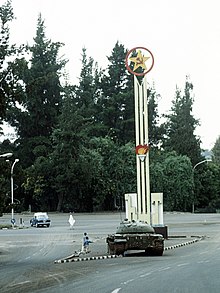

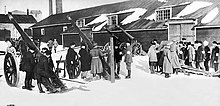

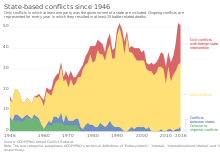

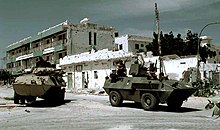
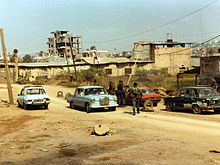
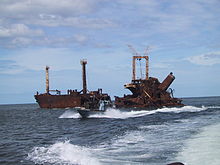
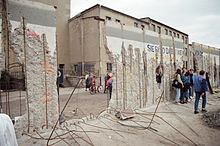
Civil War (disambiguation)List of civil warsCivil ConflictRed GuardsFinnish Civil WarGranollersSpanish Civil WaroutlineHistoryPrehistoricAncientPost-classicalCastlesEarly modernMilitary revolutionPike and shotNapoleonic warfareLate modernIndustrial warfareFourth-gen warfareMilitaryOrganizationCommand and controlDefense ministryAir forceMarinesCoast guardSpace forceReservesEngineersMedicalPoliceDivingInfantryCavalryArtillerySpecial forcesSignal corpsWarshipsSubmarinesAircraft carriersLanding craftAuxiliary shipsFightersBombersCommandClose air supportElectronic-warfareReconnaissanceFire-control systemFire-control radarDirector (military)Combat information centerShip gun fire-controlGun data computerTorpedo data computerBasic trainingMilitary manoeuvrersCombat trainingBattlespaceAerospaceAerialAirborneCold-regionDesertFortificationJungleMountainSubterraneanTunnelAmphibiousSurfaceUnderwaterSeabedInformationWeaponsAir defenceBarrageBiologicalCamouflageHorsesChemicalCombined armsConventionalDenialDisinformationElectromagneticLoiteringMissileNuclearPsychologicalRadiologicalSubmarineUnconventionalTacticsList of military tacticsAirliftAir assaultAirbridgeAirdropAnti-aircraftAnti-subAnti-tankBattleChargeCounterattackCounterinsurgencyConvoyDefeat in detailFoxholeEnvelopmentFormationGuerrillaRapid dominanceEncirclementInvestmentScreenTactical objectiveTarget saturationTrenchWithdrawalOperationalMilitary operationSpecialOperations researchBlitzkrieg